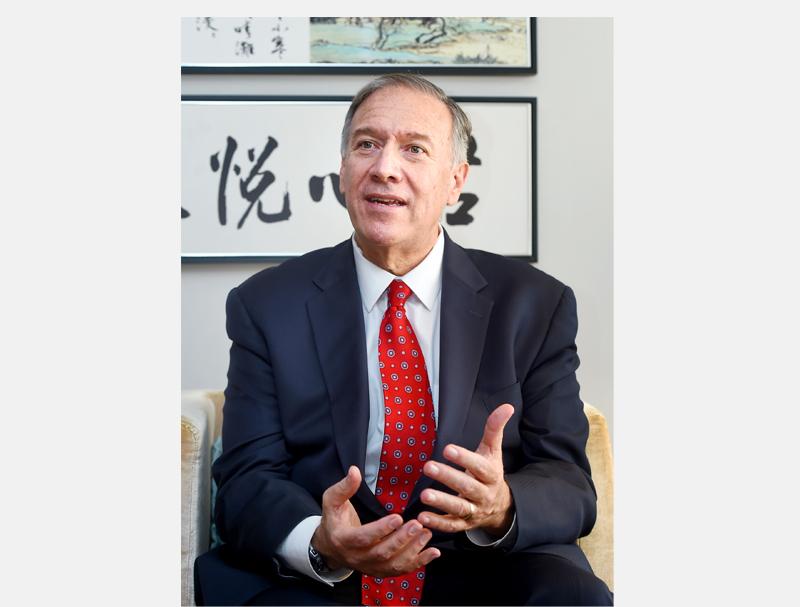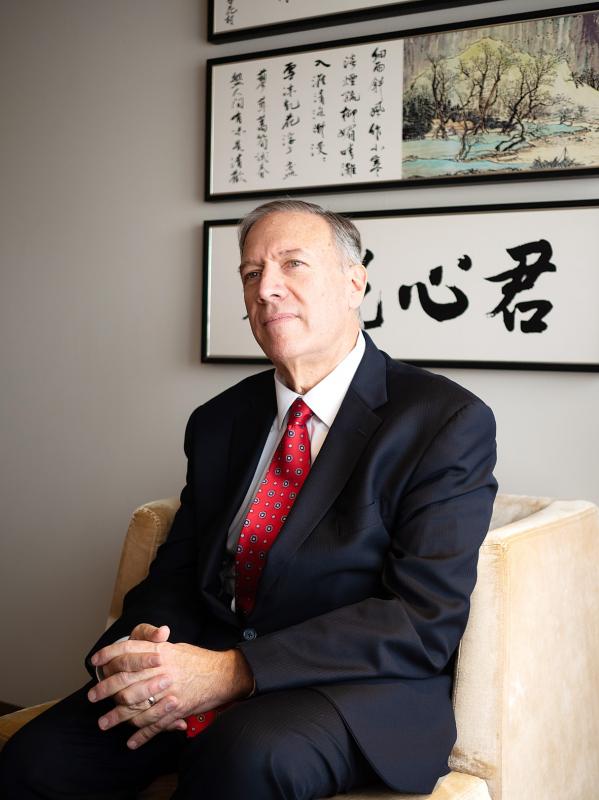Responding to the Chinese threat against Taiwan requires international cooperation and consistent deterrence, former US secretary of state Mike Pompeo said yesterday in an interview with the Taipei Times.
The former top US statesman called for clarity in the global response to growing authoritarianism.
“We all see what’s going on in the world today,” he said. “These are times when thugs, aggressors appear to be prepared to take actions which destroy the most fundamental thing that we all value: human life,” he said. “It’s time for leaders across the world to make clear there are lines which can’t be crossed and there are things which are just right and moral and deep and important, and we ought to speak to them with absolute clarity.”

Photo: Fang Pin-chao, Taipei Times
This includes declaring Taiwan’s status as an independent sovereign nation, although it would not be any different from what is already known to be true.
“When one says that Taiwan is independent, it’s almost tautological — we’ve known this for a long time,” he said. “It’s only [Chinese President] Xi Jinping (習近平) who talks about ‘reunification’ as if Taiwan was at one point a part of China.”
When it comes to countering the Chinese threat, Pompeo emphasized the importance of cooperation between nations.

Photo: Kayleigh Madjar, Taipei Times
“All of the countries in the region need to work together if we’re going to maintain this line, this demarcation that says freedom matters,” he said.
“We have to make sure we know who’s on which side of that line, and I think we can all see that pretty clearly today,” he said, referencing Russia’s invasion of Ukraine and China’s reluctance to take a stance.
It also includes military cooperation between not only US forces and Taiwan, but also the militaries of Japan, Australia and other countries that each have their own “unique capabilities,” he said.
When the military piece falls into place, “then diplomats can do their job, because that power will be there to prevent this from being an armed aggression, and we can confront the economic aggression we’ve all seen so directly from the Chinese Communist Party,” he said.
Pompeo was complimentary of the progress made by the Quadrilateral Security Dialogue, known as the Quad — a strategic dialogue between Australia, India, Japan and the US.
While the Quad evokes the idea of military cooperation, “this understanding of these nations working together has to be across the gamut,” including diplomacy, economics and intelligence sharing, he said.
“The Quad is a tool for doing that, and I would love to see other nations come around and be part of this coordinated regional effort,” he said.
However, behind this shared front, strength is necessary to serve as a deterrent against bad actors, he said.
“This idea of deterrence emanates from nation-states that are prepared to use the mighty tools that they have,” Pompeo said.
Russia’s invasion of Ukraine is an example of the failure of consistent deterrence, finding its root in alleged weaknesses exhibited by US President Joe Biden since taking office, he said, adding that for Russian President Vladimir Putin, “what changed is his perception of the risk, the cost.”
“That’s the capstone of deterrence, is convincing your enemies that their perception of risk is serious enough that they won’t take the kinds of action that we’re seeing today,” he said.
There are differences between Xi and Putin, as “Xi has a truly global vision, and Putin’s vision is about greater Russia,” Pompeo said.
China also has a massive population and globalized economy, meaning that “the problem set confronting them is that much more complicated, but that much more important as well,” he added.
While the world is rightfully uniting around the crisis in Ukraine, “we can’t lose sight of the threat from Xi Jinping,” Pompeo said. “We should maintain our understanding that the Chinese Communist Party does in fact pose the single greatest threat to our Western way of life, bar none.”
Speaking to his decision to declassify cables on the “six assurances” during his time in office, Pompeo said it was part of a broader effort to update US responses to global matters.
Pompeo said that when he took office, there were many instances in which the US was still “acting in a way that was old and outdated.”
He therefore directed the US Department of State to “draw those lines more crisply” to clarify the US’ expectations for its partners in addition to the things they would do together.
The reason this works so well for Taiwan is because “I am confident that the people here will do the heavy lifting,” he said. “The people of Taiwan are prepared to do the right things to secure their freedom.”
As for his decision to eliminate state department restrictions on interactions with Taiwan, Pompeo said that politics had nothing to do with it.
“It was just a basic recognition that the people of Taiwan are independent,” he said. “This is a sovereign nation and we ought to treat people who come to visit us in a diplomatic fashion from every sovereign nation with the respect and courtesies that they deserve.”

A car bomb killed a senior Russian general in southern Moscow yesterday morning, the latest high-profile army figure to be blown up in a blast that came just hours after Russian and Ukrainian delegates held separate talks in Miami on a plan to end the war. Kyiv has not commented on the incident, but Russian investigators said they were probing whether the blast was “linked” to “Ukrainian special forces.” The attack was similar to other assassinations of generals and pro-war figures that have either been claimed, or are widely believed to have been orchestrated, by Ukraine. Russian Lieutenant General Fanil Sarvarov, 56, head

A magnitude 7.0 earthquake struck off Yilan at 11:05pm yesterday, the Central Weather Administration (CWA) said. The epicenter was located at sea, about 32.3km east of Yilan County Hall, at a depth of 72.8km, CWA data showed There were no immediate reports of damage. The intensity of the quake, which gauges the actual effect of a seismic event, measured 4 in Yilan County area on Taiwan’s seven-tier intensity scale, the data showed. It measured 4 in other parts of eastern, northern and central Taiwan as well as Tainan, and 3 in Kaohsiung and Pingtung County, and 2 in Lienchiang and Penghu counties and 1

SAFETY FIRST: Double the number of police were deployed at the Taipei Marathon, while other cities released plans to bolster public event safety Authorities across Taiwan have stepped up security measures ahead of Christmas and New Year events, following a knife and smoke bomb attack in Taipei on Friday that left four people dead and 11 injured. In a bid to prevent potential copycat incidents, police deployments have been expanded for large gatherings, transport hubs, and other crowded public spaces, according to official statements from police and city authorities. Taipei Mayor Chiang Wan-an (蔣萬安) said the city has “comprehensively raised security readiness” in crowded areas, increased police deployments with armed officers, and intensified patrols during weekends and nighttime hours. For large-scale events, security checkpoints and explosives

‘POLITICAL GAME’: DPP lawmakers said the motion would not meet the legislative threshold needed, and accused the KMT and the TPP of trivializing the Constitution The Legislative Yuan yesterday approved a motion to initiate impeachment proceedings against President William Lai (賴清德), saying he had undermined Taiwan’s constitutional order and democracy. The motion was approved 61-50 by lawmakers from the main opposition Chinese Nationalist Party (KMT) and the smaller Taiwan People’s Party (TPP), who together hold a legislative majority. Under the motion, a roll call vote for impeachment would be held on May 19 next year, after various hearings are held and Lai is given the chance to defend himself. The move came after Lai on Monday last week did not promulgate an amendment passed by the legislature that